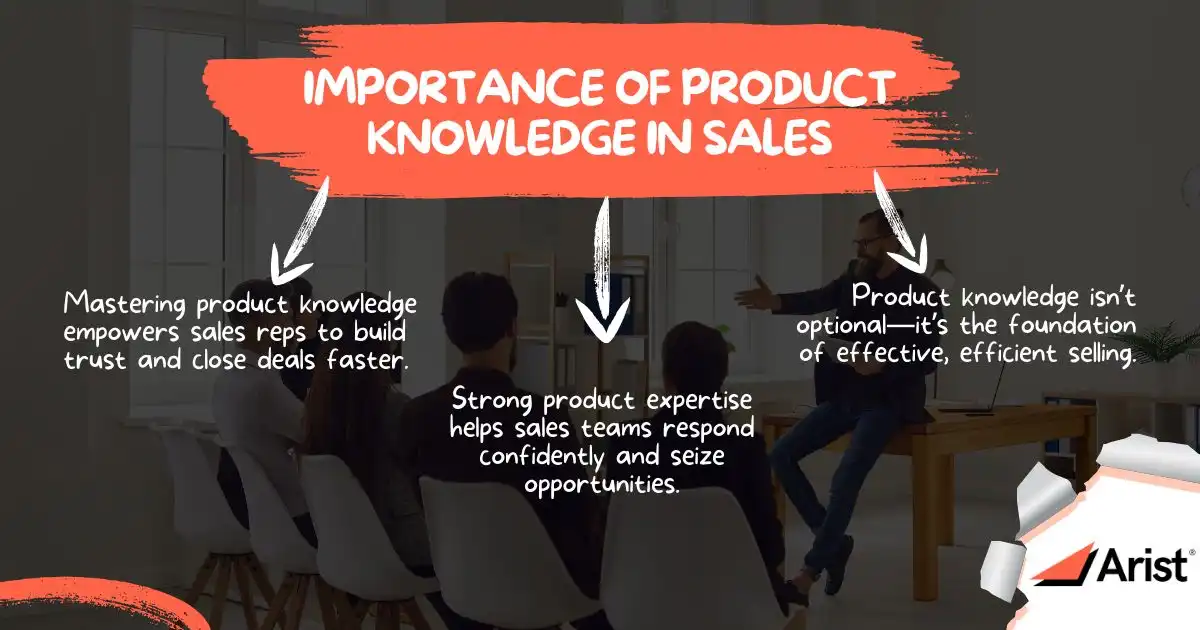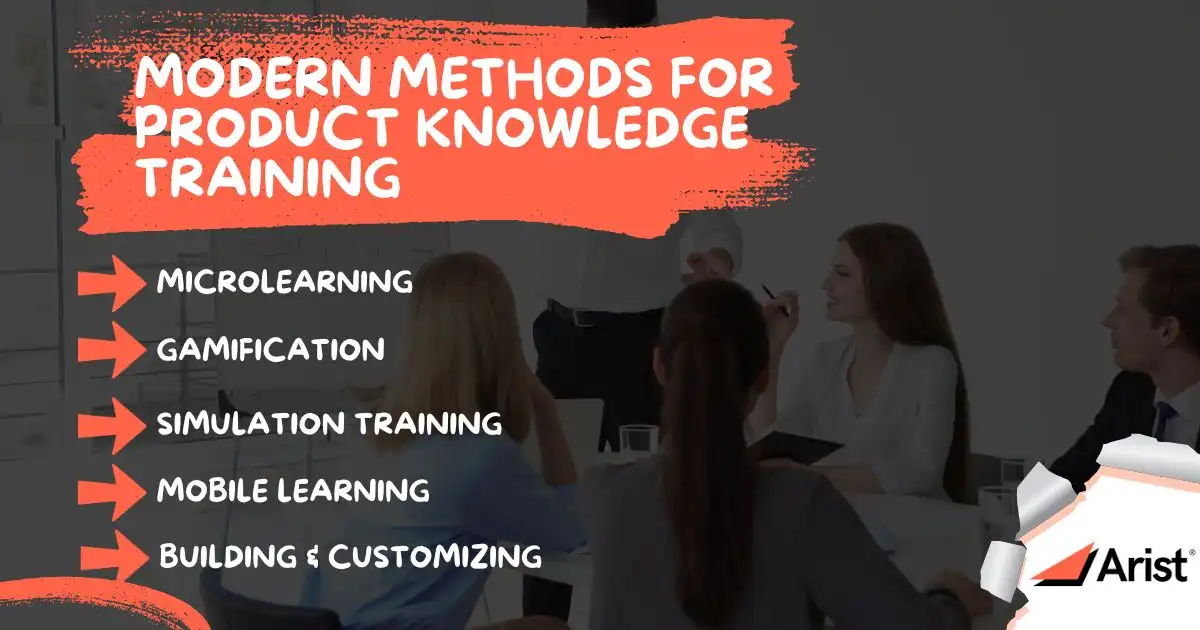Top Techniques for Faster Product Knowledge Retention
In sales, knowing your product inside and out is non-negotiable—it’s the foundation of every pitch, every customer interaction, and every closed deal. However, not all products are simple, and with new features, updates, and evolving customer expectations, staying on top of product knowledge can feel overwhelming for sales reps.
Modern training techniques can help your team learn faster, retain more, and confidently apply their knowledge. These techniques help your team stay ahead of the curve and win more deals.
Importance of Product Knowledge in Sales

In sales, even a split second can make the difference between closing a deal or losing it.
According to a Harvard Business Review study, companies that reached out to potential leads within an hour were nearly seven times more likely to qualify them than those who waited longer.
These findings aren’t just trivia — they highlight a simple truth: speed and product knowledge go hand in hand. The faster your sales team masters the details, the better they can jump on opportunities before prospects cool off or turn to competitors.
The problem is that salespeople are busy. Who has time for long, traditional training sessions between prospecting, client meetings, and follow-ups? Instead, they pile up the to-do list, create backlogs, and leave customers waiting longer.
Efficiency doesn’t just boost productivity—it keeps morale up, too. When reps have what they need at their fingertips, they’re more confident, engaged, and better equipped to balance their workload. The result? A sales team ready to seize the moment and happier doing it.
Modern Methods for Product Knowledge Training

As the younger generation says, “Modern problems require modern solutions.” If traditional training methods are a no-go, then it’s worth exploring modern ones.
Take a look at how these training methods can accelerate product knowledge adoption.
1. Microlearning
First up is microlearning. Think of it as taking smaller bites of information rather than swallowing the whole meal simultaneously. Instead of one long, dense training session, you break the material into short, focused lessons. This approach makes it easier for reps to absorb key details and apply them right away quickly.
A helpful way to imagine it? Microlearning is like snacking throughout the day instead of attending a massive feast. One big meal might leave you feeling stuffed and sluggish, but a handful of quick bites keeps your energy up without overwhelming you.
Research supports this idea, too. A study by Bruck, Motiwalla, and Foerster (2012) found that delivering content in shorter, mobile-friendly chunks significantly improved learner engagement and retention. In other words, when information is easier to digest, it sticks.
If you want to roll this out efficiently, consider using an AI-powered tool like Arist. Arist specializes in microlearning and can whip up training modules in seconds. It then delivers them through familiar communication channels like Slack, SMS, or Teams, so your reps don’t have to step away from their daily tasks.
Why It Works:
Short, targeted lessons fit naturally into a salesperson’s busy schedule. Instead of pausing their entire day for a lengthy session, reps can brush up on features between calls, on the way to meetings, or whenever they have a moment to spare.
Example:
Instead of a single one-hour video about your new product, break it down into a handful of five-minute clips. Each clip might cover one feature or benefit, paired with a quick infographic. In no time, your team will know the product inside and out without ever feeling bogged down.
2. Gamification
Learning new information can be dull, if not tedious, significantly impacting employee engagement and retention. Why not make the experience fun by incorporating gaming elements at work? While gamification is excellent for grabbing attention and boosting initial engagement, it doesn’t always guarantee long-term retention. Integrating gamification with microlearning can bridge this gap, combining excitement with sustained knowledge retention.
A TalentLMS study found that gamification brightens employees’ moods and boosts their productivity. The idea is simple: Mix in elements like leaderboards, points, and quizzes so learning doesn’t feel like a chore. Instead, it feels like a friendly competition where everyone is motivated to do their best.
You can roll this out in many ways. Maybe it’s a real-world challenge in the office or a digital quiz integrated into your company’s communication app. Either way, it should feel seamless and natural, not forced or gimmicky.
Why It Works:
Gamification taps into sales reps' natural competitive drive. When a reward is on the line, such as a gift card or an extra break, reps are more likely to stay engaged and remember what they’ve learned.
Example:
Picture a points-based quiz on the latest product details. Top scorers might earn a small prize or a bonus perk—something fun and meaningful. You’ll see reps competing for the top spot and soaking up crucial knowledge in no time.
3. Simulation Training
Would you ever let your team test their skills in a “practice run” before they hit the real world? That’s what simulation training is all about. It creates a safe, controlled environment that feels like the real thing without the actual risk.
Instead of telling sales reps what to do, you should let them try it themselves. They can rehearse their pitch, ask tough questions, and explore the product’s features while getting immediate feedback. This gives them a chance to fine-tune their approach before it counts.
Why It Works:
There’s nothing quite like learning by doing. Simulation training helps reps build confidence and lock in product details for the long term.
Example:
Set up a virtual call where a rep “meets” a simulated customer interested in a new product feature. The rep walks through the benefits, answers questions, and refines their delivery—all in a low-pressure setting.
4. Mobile Learning
Sales reps might rarely log into a dedicated learning system, but they check their phones every few minutes. Why not leverage that habit to deliver crucial training content? Mobile-friendly platforms make learning as accessible as scrolling through social media or checking emails. Whether it’s during a morning commute, a quick pause between client calls, or a few spare moments before a meeting, mobile learning transforms these snippets of time into valuable opportunities for growth.
By making training flexible and portable, reps can stay informed and sharpen their skills wherever they are—no need to be stuck at a desk or wait for a dedicated training session.
Why It Works:
When reps can access training materials on their terms, they’re more likely to use them. That convenience leads to better adoption—and better results.
Example:
Instead of asking your team to sit through lengthy training sessions, consider using a mobile-friendly platform like Arist. Arist delivers bite-sized lessons and quizzes to their phones—no extra logins or complicated tools. Imagine sending a quick, 5-minute lesson on a new feature during the morning commute. Your reps can learn key product details before their first meeting, never missing a beat.
5. AI for Building and Customizing Product Content
Gone are the days of using a one-size-fits-all training method. Relying solely on a single approach can limit how effectively your team builds product knowledge. Instead, a more innovative and adaptive approach combines AI-powered tools to create personalized, modular learning experiences.
AI enables the creation of custom product content tailored to individual learning needs and roles. Sales reps can access training relevant to their specific responsibilities and learning pace through interactive online modules or quick, instructor-led coaching sessions. AI helps adjust content dynamically, ensuring reps receive updated and precise knowledge aligned with new product features or strategies.
Why It Works:
AI takes the guesswork out of training, allowing for real-time updates and highly personalized content. Pairing self-paced, flexible digital learning with live, interactive sessions addresses convenience and the need for deeper, collaborative understanding. This dual approach fosters engagement and makes it easier for reps to absorb and retain complex information.
Example:
When launching a new product with AI-curated content, start with a live webinar to cover high-level concepts, followed by tailored, AI-driven, self-paced modules. Reps can then engage in interactive coaching sessions to ask questions and discuss strategies, creating a comprehensive, adaptable learning experience.
Keeping Up and Staying Competitive
The business market is faster and more competitive than ever. Every moment represents an opportunity to make a lasting impression, especially in sales, where success hinges on being informed, prepared, and adaptable.
Arist helps businesses meet these demands by transforming training into quick, digestible lessons delivered via SMS or email. This ensures that your sales reps gain the knowledge they need—precisely when needed—without disrupting their busy schedules. With Arist, you can empower your team to excel in every customer interaction, close more deals, and foster stronger relationships.
Invest in tools that make learning seamless and practical. With Arist, you can adopt product knowledge faster and achieve an active edge.
Arist Team
Bring
real impact
to your people
We care about solving meaningful problems and being thought partners first and foremost. Arist is used and loved by the Fortune 500 — and we'd love to support your goals.
Curious to get a demo or free trial? We'd love to chat:


